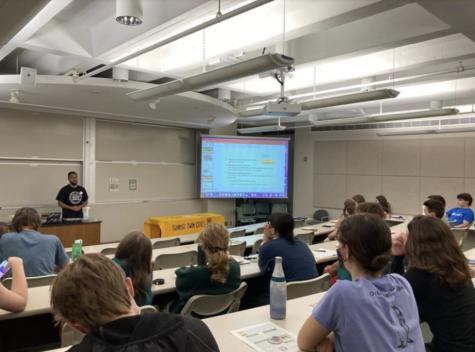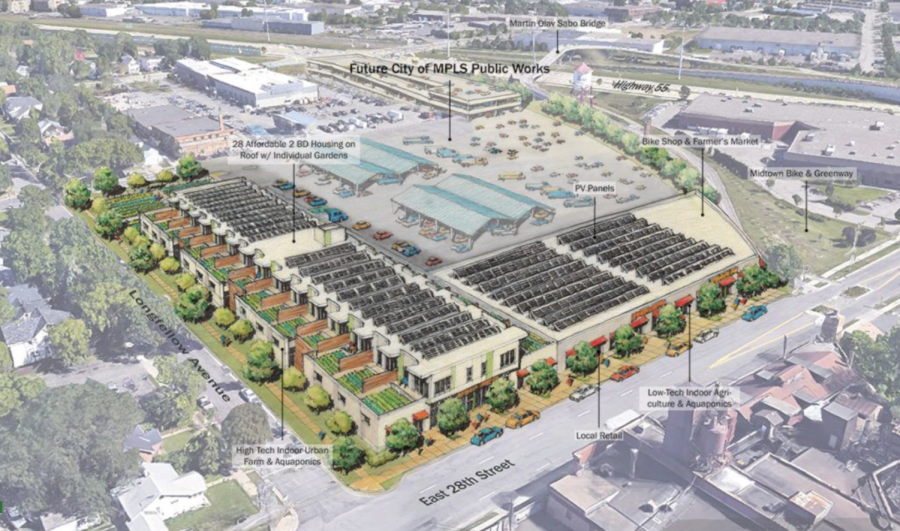A City’s Broken Promises: Environmental Injustice in East Phillips
A rendering of the East Phillips Neighborhood Institute’s vision for the Roof Depot site Photo courtesy of East Phillips Neighborhood Institute.
February 16, 2023
On Thursday, Jan 26, the Minneapolis City Council voted to approve the demolition of the Roof Depot building in the city’s East Phillips neighborhood. This demolition is the first step in the Hiawatha Expansion Project, a public works facility that will increase pollution in an already over-polluted neighborhood. While East Phillips residents and supporters have organized for years around a proposed urban farm and community center for the site, the city is set to begin the irreversible demolition later this month. This vote represents a blatant environmental injustice and a betrayal of the city’s stated racial and environmental equity promises.
East Phillips
East Phillips, located south of downtown Minneapolis, is one of the city’s most diverse neighborhoods with over 70% residents of color. East Phillips also includes the Little Earth community, the only Indigenous project-based Section 8 housing community in the country. Moreover, 32% of households in East Phillips are below the poverty line.
The history of environmental discrimination in East Phillips is staggering. The neighborhood is home to the “arsenic triangle” due to ongoing arsenic ground contamination from 1938-1963 by a chemical manufacturer in East Phillips, a toxin with effects including cancer to decreased cognitive development for children. Between 2004 and 2011, the soil of over 600 homes in the area had to be excavated to remove arsenic. Today, East Phillips continues to face high pollution levels from Smith Foundry, Bituminous Roadways (an asphalt-mixing plant) and high traffic in the area. The neighborhood’s particulate matter levels are in the highest 10% in the state and it has two to four times the rate of asthma emergency room visits as the Twin Cities metro area. Minneapolis’ proposed public works expansion would only increase the already disproportionate pollution in the neighborhood.
EPNI’s plan for the site

To combat the historical effects of pollution on East Phillips, neighborhood organizers from the East Phillips Neighborhood Institute (EPNI) created a plan in 2014 that would stop potential polluters from moving into the vacant Roof Depot site while creating sustainable change for the community. This plan would, while keeping the existing building intact, convert the 7.5 acre site into an urban farm, community center and market.
The proposed project includes indoor farming, 28 units of affordable two-bedroom housing, community spaces, solar energy, spaces for small businesses and the creation of green jobs and job-training programs. The indoor hydroponic and aquaponic farming would provide sustainable, organic food to the neighborhood, which is currently a food desert. The site would also be a wealth-building opportunity for the community as ⅓ of the property would be owned by East Phillips residents (with ⅓ owned by tenants and ⅓ owned by outside investors). The community has already raised millions of dollars for the project and partnered with local businesses to fill the retail spaces.
The city’s plan for the site
Along with denying the community the urban farm, the Hiawatha Expansion Project (the city’s vision for the site), endangers East Phillips by increasing pollution through vehicle emissions and arsenic release from demolition. The proposed public works expansion drastically worsens air pollution as it includes hundreds of new parking spaces and a new diesel refueling station, increasing vehicle trips to the neighborhood by 1,800 per day. Residents are also concerned that the demolition of the Roof Depot building would release arsenic, currently sealed in the ground under the building’s foundation, into the air. These cumulative impacts, heightened with the already existing pollution in East Phillips, represent a failure of the city of Minneapolis to protect the health of all its citizens.
Minneapolis’ proposal also directly contradicts multiple city policies. A 2008 permitting law states that the Minnesota Pollution Control Agency must evaluate “cumulative levels and effects of past and current pollution” before issuing permits for the construction of facilities in several areas of the Twin Cities, including the East Phillips neighborhood. The city has yet failed to produce a cumulative environmental impact statement. East Phillips is also a part of the South Side Green Zone. Green zones, designated by the city, are areas with high levels of environmental pollution and a history of racial and economic marginalization. Under the green zone policy, Minneapolis is supposed to work with neighborhoods to address environmental and social justice issues. The East Phillips indoor urban farm project aligns with these goals because it promotes both sustainability and economic wellbeing for the East Phillips community. In contrast, the city’s plan actively violates the green zone policy by further contributing to pollution in an already marginalized community.
Current status
The city council vote on Jan 26, with dozens of urban farm supporters protesting in the council chamber, was a crushing legal blow to EPNI’s legal fight. On Monday, Feb 13, Hennepin County District Judge Edward Wahl ruled against EPNI in their injunction case against the city, seemingly ending their last significant legal avenue to stopping demolition. Demolition of the Roof Depot building is set to begin on Feb 27.
Minneapolis’ continuing support of this harmful project against community wishes is unacceptable. If their public works expansion comes to fruition, the added pollution will impact East Phillips residents for generations to come. The community is not abandoning their dream for an urban farm, and they will continue to resist the city’s project. For more information on EPNI and how to get involved, see their Linktree.

Sunrise Macalester is the Macalester-based hub of the Sunrise Movement, a national, youth-led movement against climate change. We meet in CC206 and on Zoom every Sunday at 5pm. Join us as we fight for a livable, equitable future!













